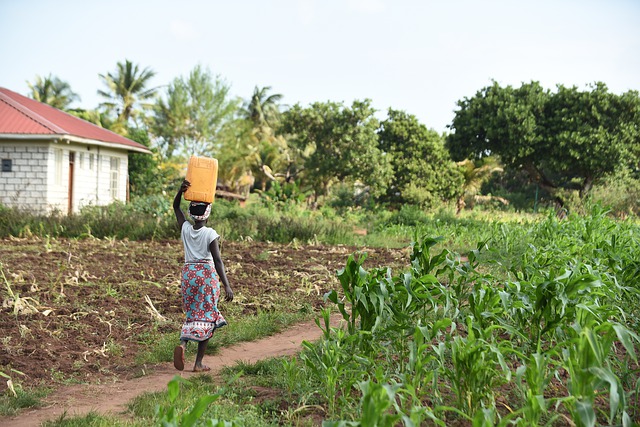June 2, 2020
By Lynda Kiernan, Global AgInvesting Media
Apollo Agriculture, an agricultural products and financial services platform helping small-scale farmers in Kenya maximize their profits, announced it has raised $6 million through a Series A led by Anthemis Exponential Ventures.
Also participating in the round were Leaps by Bayer, Flourish Ventures, Sage Hill Capital, To Ventures Food, Breyer Labs, along with existing investors Accion Venture Lab and Newid Capital, among others.
Founded in Nairobi by former colleagues at The Climate Corporation – Eli Pollak, Earl St. Sauver, and Benjamin Njenga – Apollo Agriculture employs machine learning and automated technologies together with operational experience from The Climate Corporation, Tesla, and One Acre Fund to drive its mobile suite of bundled agricultural products and services. The company offers everything a farmer needs at all stages of the growing season – from farm inputs, insurance, advice, financing, and in some cases, market access.
Growing up on a farm in Kenya with his smallholder mother, Njenga experienced first-hand being in the position of not being able to secure the financing to afford higher-quality seeds, and the necessary fertilizers and inputs in order to realize better yields and greater returns.
“We knew if she’d used fertilizer and hybrid seeds her production would double, making it easier to pay my school fees,” Njenga told Tech Crunch.
“Every farmer, everywhere, deserves the opportunity to farm profitably, and that is not the norm today,” said Njenga, chief customer officer, Apollo Agriculture. “There are more than 500 million small-scale farmers globally, and average farm yields per acre across Africa are only 10-20 percent of those in North America. Apollo exists to change that. We partner with farmers to maximize their farm productivity and profitability.”
“Farmers can purchase high-quality farming inputs, such as hybrid seeds and fertilizer, on credit with flexible repayment terms and post-harvest due dates,” explained Ashley Lewis, senior investment officer for Africa, Accion Venture Lab, in the article, Investment firm Accion explains why it backed Nairobi-based Apollo Agriculture, published in How We Made it in Africa.
“The offering also includes customer-centric, voice-based trainings developed by the Apollo team to help farmers learn best practices for tasks like planting and combating pests and to develop financial literacy.”
Through its business model, Apollo earns revenue on the sale of farm products, and through margins on financing. “The farm pays a fixed price for the package, which comes due at harvest…that includes everything and there’s no hidden fees,” Pollak told Tech Crunch.
The capital from this investment will support Apollo as it continues to rapidly scale through growing its farmer partnerships (which have already reached 25,000 farmers to-date in 2020), expanding its product offerings, and expanding its team.
“We are incredibly excited to bring together a world-class group of investors, with expertise across financial services and agriculture, to help power Apollo’s growth in the coming years,” said Pollak.
“Our mission is more important than ever in the context of COVID-19, when health risks, supply chain disruptions, and reduced mobility threaten food security for millions globally. Our digital model has enabled us to continue partnering with farmers to produce more food, despite the unprecedented disruptions of COVID-19.”
Even prior to the global spread of COVID-19, access to financing was a recurring problem for the world’s 300 million smallholder farmers, who face a funding gap of more than $167 billion, stated Ashley Lewis. Of these 300 million, 50 million smallholders are farming in sub-Saharan Africa.
Lewis explained the range of additional challenges these farmers are facing, including climate change, trade volatility, market access, and the fallout from the global pandemic.
“In 2016, we supported Apollo Agriculture in their pre-seed round to help address the impediments smallholder farmers face, and we are excited to have the opportunity to support them again in a follow-on investment in their Series A,” said Lewis.
Similarly, Twiga, another Kenyan agtech startup, has been gaining investors and capital to use mobile technology to align supply and demand in Africa’s large, but fragmented fruit and vegetable market.
Also founded in Nairobi in 2014, Twiga’s vendors can use the company’s m-commerce platform to order produce as-and-when needed, which is then delivered to the customer’s doorstep. In return, farmers are paid within 48 hours of collection with mobile money, giving them increased income and allowing for better financial planning.
Instead of seeing Twiga as a threat, Pollak told Tech Crunch he sees possible opportunity for the two companies to work together in the future, saying, “We’re partnering with farmers to produce lots of high-quality crops, and they could potentially be a great partner in helping those farmers access stable prices for those…yields.”
– Lynda Kiernan is editor with GAI Media, and is managing editor and daily contributor for Global AgInvesting’s AgInvesting Weekly News and Agtech Intel News, and HighQuest Group’s Oilseed & Grain News. She is also a contributor to the GAI Gazette. She can be reached at lkiernan@globalaginvesting.com

Let GAI News inform your engagement in the agriculture sector.
GAI News provides crucial and timely news and insight to help you stay ahead of critical agricultural trends through free delivery of two weekly newsletters, Ag Investing Weekly and AgTech Intel.




